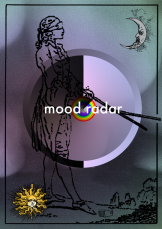User:Amy Suo Wu/Mood Radar overview
Amy, Mood Radar, Trimester 6, 2012.
Mood Radar
The weather, at foremost, is a primordial force that underpins the struggle to come to terms with the chaos of world manifested originally in its natural phenomena. Divination as one of the earliest guiding and coping mechanisms with such uncertainty, explores the uncharted in order to seek answers to questions beyond the scope of ordinary human understanding and can be considered a para-rational practice. The para-rational model proposed by Edward A. Shanken, is one that aims to transcend binary oppositions by involving complementary modes of inquiry, of both rationality and irrationality in forming a cohesive and self-reflexive application to alternative ways of knowing, one that goes beyond the hegemonic scientific discourse (Shanken, 2010). Maureen Perkins draws historical examples from C19th Britain to show that what counted as 'knowledge', was dictated by doctrines of progress; a project that had implications in the development of modern consumerism. Ever since, a steady shift towards favouring rationalism over other forms of inquiry have dominated scientific discourse (Perkins, 1996, 2004). Legitimised predictions, virtually a technological practice today, are perhaps more important. They have become, however, more about eliminating risk, efficient time management, surveillance, preemptive marketing and to some, this is beginning of the 'colonisation of the future'.
Mood Radar, as the practical application of these ideas, is an personal weather forecasting system that predicts the weather based on mood. Personal readings will take place in a semi-autonomous space that is reminiscent of both science lab and gypsy caravan outside of TENT. Interviews of visitors will be conducted while holding a divining rod specially designed with para-rational methods, that measures the body's unconscious movements and bio-electric signals, to draw up a map of their mood. Acting as a personal weather forecast chart, the map reveals how they will experience the weather tomorrow. From reversing the common-sense statement 'the weather affects your mood' to 'your mood affects the weather', I flip the linear understanding of causality, of subject and object, in hopes of offering a space to contemplate upon causal factors that do not necessarily subscribe to a scientific paradigm. This work aims to simultaneously problematise and straddle the rational/irrational dichotomy in an attempt to transcend it, by addressing the shades of believability and the tension between meaning vs. randomness. It also tries to playfully rethink the idea of uncertainty as a negative event while metaphorically alluding to discourse regimes which shape reality.
Media
Photos
Audio
The audio is from short interviews I made in public and serves as an example of how interview sessions might be in the 'lab-caravan'. File:Future audio2.ogv
Essay
approx. 100 word abstract
This paper is the theoretical complement to the practical component of a larger body of research on the role of prediction. The practical application of this thesis is an alternative weather forecasting system that predicts the weather based on measuring mood. The overarching objective is to question discourse regimes and how they shape reality through the management and construction of acceptable knowledge. Para-rationalism is explored as a method to simultaneously problematise and straddle the rational/irrational dichotomy in an attempt to transcend it. Divination can be seen as an example of para-rationalism and is addressed through the notions of paradox, synchronicity, truth as a model and self-fulfilling prophecies. Divination's legacy is traced in predictive algorithms in modern secular society seizing it's utility for surveillance and market driven incentives in the name of progress.
List of References
Books:
Boia, L (2005) 'The Weather Imagination', London: Reaktion books.
Franz, M-L v. (1980) 'On Divination and Synchronicity : The Psychology of Meaningful Chance Studies in Jungian Psychology', Toronto: Inner City Books.
Hall, S (1997) 'Representation: cultural representations and signifying practices', London: SAGE Publication Ltd.
Hofstadter, D (2007) 'I am a Strange Loop', New York: Basic Books.
Perkins, M (2001) 'The Reform of Time. Magic and Modernity', London: Pluto Press.
Perkins, M (1996) 'Visions of the Future. Almanacs, Time and Cultural Change, 1775-1870', Oxford: Oxford University Press.
Wiener, N (1966) 'God and Golem, Inc. A Comment on Certain Points where Cybernetics Impinges on Religion', Massachusetts: The M.I.T Press.
Articles:
Gladwell, M (2006) 'The formula. What if you built a machine to predict hit movies?' Online article available at: http://www.newyorker.com/archive/2006/10/16/061016fa_fact6
Hollinger, V (2006) 'Stories about the Future: From Patterns of Expectation to Pattern Recognition' in Science Fiction Studies, Vol. 33, No. 3 (pp. 452-472). SF-TH Inc.
Holmes, B (2007) 'Future Map.' Online article available at: http://brianholmes.wordpress.com/2007/09/09/future-map/
Latour, B (2004) 'Why Has Critique Run Out of Steam? From Matters of Fact to Matters of Concern', in Critical Inquiry, Vol. 30, No. 2. (pp. 225-248). University of Chicago. Online article available at: http://mendota.english.wisc.edu/~clc/Latour.pdf
Marsching, J.D (2003) 'Orbs, Blobs, and Glows: Astronauts, UFOs, and Photography' in Art Journal, Vol. 62, No. 3 (pp. 56-65) New York: College Art Association
May, S (2003) 'Meteorologica.' London: Tate Publishing. Online article available at: http://www.olafureliasson.net/publications/download_texts/Meterologica.pdf
Pizarro, D (2011) 'Everyday Apophenia.' Online article available at: http://www.edge.org/responses/what-scientific-concept-would-improve-everybodys-cognitive-toolkit
Shanken, E (2010) 'Knowing Art, Transcending Science.' Online article available at: http://www.artexetra.files.wordpress.com/2009/02/shanken_knowing_art_transcending_science_2010.pdf
Tedlock. B (2001) 'Divination as a Way of Knowing: Embodiment, Visualisation, Narrative, and Interpretation' in Folklore, Vol. 112, No. 2 ( pp. 189-197). Taylor and Francis, Ltd
Lectures:
Cramer, F (2006) 'Tangent Conspiracies'. Online video available at: http://www.youtube.com/watch?v=TjbI8AQi3uA
Slavin, K (2011) 'How algorithms shape our world.' Online video available at: http://www.ted.com/talks/kevin_slavin_how_algorithms_shape_our_world.html?c=289257
Bibliography:
Curtis, A (2007) 'The Trap — What Happened to our Dream of Freedom' (documentary)
Curtis, A (2011) 'All Watched Over By Machines of Loving Grace' (documentary)
Aronofsky, D (1998) 'Pi' (feature film)
Thesis:
Reclaiming uncertainty Second draft
Reclaiming uncertainty Final draft
Reclaiming uncertainty Final Thesis, Woot!!!




